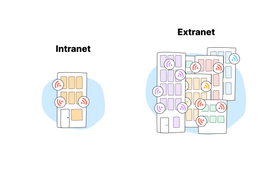Knowledge Management vs Document Management: Key Differences
Find out different purposes of knowledge and document management to make an informed decision
Published November 5, 2023

We live in a data-driven world. Statista predicts that by 2025, global data creation is projected to grow to more than 180 zettabytes. A single one equals one trillion gigabytes, so that is a massive data volume.
To grab information out of the sea of files and folders, you need a proper tool like knowledge or document management. They are related concepts separated by a few key differences, and knowing the difference can assure your company's success, so let's dive into their nuances.
What Is Knowledge Management?
Knowledge management involves capturing, organizing, and applying all the knowledge within your company to improve performance.
The three broad categories of knowledge you can organize are:
- Explicit knowledge: The information that can be quickly recorded via documents.
- Implicit knowledge: Informal networks with information that may need to be codified.
- Tacit knowledge: Experience acquired through practice.
✶ Learn more about knowledge management and how to use it
Knowledge Management Benefits
The benefits of knowledge management from formal and informal information sources are:
- Preservation of knowledge and expertise
- Improved collaboration
- Faster decision-making
- Innovation
✶ Check out these steps to developing a knowledge management strategy
What Is Document Management?
Document management takes care of document, file, and record organization. It is better suited for users familiar with the information within the system because it lets them find it quickly.
Document Management Benefits
Document management has many benefits for organizations that handle massive volumes of structured data, including:
- Compliance with regulations
- Efficient workflow
- Improved organization
Key Differences
Knowledge Management
Knowledge management enables easier information discovery, maximizing the value of the company's intellectual assets. It prevents the formation of data silos, leading to more transparency, innovation, problem-solving, and decision-making.
✶ Read more about knowledge management processes for an effective strategy
Document Management
Document management helps companies sort, categorize, and safely store vast data. It also makes the information easily accessible to employees through an interface.
Integration and Synergy
Storing and sharing information are two sides of the same coin, forever linking document management with knowledge management. The combination makes knowledge creation easier since you have a framework for quickly retrieving documents.
✶ Understand knowledge management matrix and steps to improve team performance
Ensuring Organizational Excellence
Enterprise search engines help companies make the most of their organizational knowledge.
An enterprise search solution like Unleash combines the benefits of knowledge and document management to make your search more efficient, productive, and streamlined. It searches every folder and application, delivering relevant results quickly.





